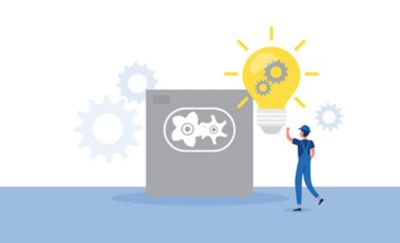The owner’s manual contains detailed, model-specific instructions and safety measures that generic guidelines maynot cover. It clarifies proper operating procedures, maintenance schedules, and warns about common pitfalls unique to the compressor, reducing the risk of accidents and mechanical failure.
Air compressors are indispensable tools in various industries, from construction to manufacturing. However, their powerful nature means they come with inherent risks. Ensuring air compressor safety is crucial to prevent accidents, protect operators, and maintain equipment longevity.
This blog outlines air compressor safety guidelines, providing you with the knowledge to operate these machines safely and efficiently. More Specifically:
What does Air Compressor Safety mean?
Air compressors, while useful, can be dangerous if not handled correctly. They operate under high pressure, and any mishandling can lead to severe injuries or equipment damage. Understanding air compressor safety involves recognizing potential hazards and adhering to established safety protocols.
Key Safety Measures
- Review the Owner’s Manual: The manual is your roadmap to safe and efficient operation. It provides model-specific instructions, maintenance schedules, and safety precautions.
- Regular Inspections: Just like a car needs regular maintenance, air compressors require ongoing attention to air filters, pressure settings, hoses, and connections.
- Environmental Vigilance: Ensure the compressor operates in a clear, dry, and stable environment to avoid risks associated with clutter, moisture, and temperature fluctuations.
- Consult Experts: When in doubt, seek advice from knowledgeable professionals to preemptively resolve potential hazards.
Pre-operation Safety Checks
Before using an air compressor, a thorough pre-operation inspection is essential. This step ensures that the equipment is in good working condition and safe to use.
Checklist for Pre-operation Safety
- Inspect for Physical Damage: Check for any visible damage, leaks, or loose fittings.
- Clean or Replace Filters: Ensure air filters are clean to maintain efficient airflow.
- Test Safety Features: Verify that pressure relief valves and other safety features are functioning correctly.
Correct Installation and Grounding
Proper installation and grounding of the air compressor are critical to its safe operation. Incorrect installation can lead to electrical hazards and equipment failure.
Installation Guidelines
- Follow Manufacturer Instructions: Adhere to specific guidelines regarding ventilation, clearance space, and stable mounting.
- Ensure Proper Grounding: Correct grounding reduces electrical risks, much like anchoring a ship before a storm.
Appropriate Components and Sizing
Using the right parts and sizing the air compressor correctly is important. This helps prevent pressure losses, leaks, and possible failures.
Component Inspection
- Check Hoses and Fittings: Inspect for wear or damage and replace compromised parts immediately.
- Select the Right Capacity: Choose an air compressor with the appropriate capacity for your needs to avoid overheating or inefficiency.
Safe Operating Practices
Safe operation of an air compressor involves understanding its controls and features, following proper startup and shutdown sequences, and adjusting pressure settings according to application needs.
Operating Guidelines
- Wear Personal Protective Equipment (PPE): Use safety goggles, gloves, hearing protection, and appropriate workwear.
- Monitor for Unusual Signs: Be vigilant for unusual sounds, vibrations, or leaks, and address them immediately.
Regular Maintenance and Care
Consistent maintenance is crucial to extend the compressor’s service life and ensure safety. Routine inspections, cleaning, and adherence to lubrication schedules are essential practices.
Maintenance Tasks
- Inspect for Leaks and Wear: Regularly check for any signs of wear or leaks.
- Clean Air Filters: Prevent dirt and debris from entering sensitive areas.
- Store Properly: Keep the compressor in a dry, tempered, and ventilated environment.
Troubleshooting and Professional Support
When to Seek Professional Help
Professional help can always give you the right support and air compressor safety guidelines. Despite you can take some precautions by yourself, the technicians can be very helpful in several moments, such as:
- Complex Malfunctions: Issues like motor failures or persistent pressure problems require expert attention.
- Routine Troubleshooting: Minor issues like loose fittings or dirty filters can be addressed by users.
Get in touch with the expert
Ensuring air compressor safety is a multifaceted process that involves understanding the equipment, adhering to safety protocols, and performing regular maintenance. By following these guidelines, you can operate your air compressor safely and efficiently, minimizing hazards and extending the equipment’s lifespan. Remember, safety is not just a protocol but a commitment to protecting yourself and those around you.
Frequently Asked Questions
Improper use can lead to sudden pressure bursts, component failure, and air leaks, all of which can cause injuries from flying debris, loud noise, or even explosions. Equipment damage can also result in downtime and financial loss for businesses.
Maintenance schedules can vary depending on the model and usage frequency but, as a rule of thumb, routine checks should be done before every use, with more thorough inspections monthly or quarterly. The owner's manual provides exact recommendations to follow.
You should seek assistance from qualified experts, ideally through customer support channels provided by the compressor supplier or manufacturer. Expert guidance helps diagnose problems correctly and offers solutions that uphold safety standards without voiding warranties or damaging the machine.
Get tailored advice
Still have questions after reading? Our expert is ready to help you make sense of it all and guide you to the best solution.
Write to an Expert Today – Get the answers you need.






